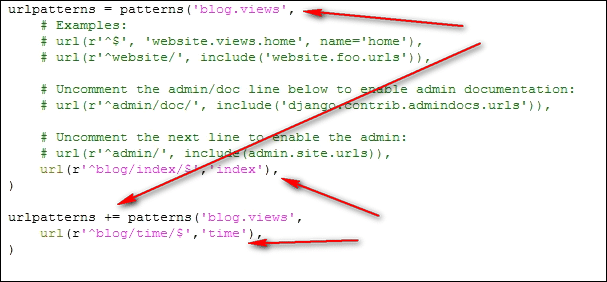жӮЁеҘҪпјҢзҷ»еҪ•еҗҺжүҚиғҪдёӢи®ўеҚ•е“ҰпјҒ
жӮЁеҘҪпјҢзҷ»еҪ•еҗҺжүҚиғҪдёӢи®ўеҚ•е“ҰпјҒ
иҝҷзҜҮж–Үз« дё»иҰҒд»Ӣз»ҚдәҶDjangoдёӯеҰӮдҪ•е®һзҺ°urls.pyйҮҚжһ„еҸҠеҸӮж•°дј йҖ’пјҢе…·жңүдёҖе®ҡеҖҹйүҙд»·еҖјпјҢж„ҹе…ҙи¶Јзҡ„жңӢеҸӢеҸҜд»ҘеҸӮиҖғдёӢпјҢеёҢжңӣеӨ§е®¶йҳ…иҜ»е®ҢиҝҷзҜҮж–Үз« д№ӢеҗҺеӨ§жңү收иҺ·пјҢдёӢйқўи®©е°Ҹзј–еёҰзқҖеӨ§е®¶дёҖиө·дәҶи§ЈдёҖдёӢгҖӮ
1. еҶ…йғЁйҮҚжһ„#

2. еӨ–йғЁйҮҚжһ„#
website/blog/urls.py

website/website/urls.py

3. дёӨз§ҚеҸӮж•°еӨ„зҗҶж–№ејҸ #
1. blog/index/?id=1234&name=bikmin#
#urls.py
url(r'^blog/index/$','get_id_name')
#views.py
from django.http import HttpResponse
from django.template import loader,Context
def get_id_name(request):
html = loader.get_template("index.html")
id = request.GET.get("id")
name = request.GET.get("name")
context = Context({"id":id,"name":name})
return HttpResponse(html.render(context))#index.html
<body>
<li>id:{{ id }}</li>
<li>name:{{ name }}</li>
</body>ж•ҲжһңеҰӮдёӢ

2. blog/index/1234/bikmin#
#urls.py
url(r'^blog/index/(\d{4})/(\w+)/$','blog.views.get_id_name')#views.py
from django.http import HttpResponse
from django.template import loader,Context
def get_id_name(request,p1,p2):
html = loader.get_template("index.html")
context = Context({"id":p1,"name":p2})
return HttpResponse(html.render(context))#index.html
<body>
<li>id:{{ id }}</li>
<li>name:{{ name }}</li>
</body>ж•ҲжһңеҰӮдёӢпјҡ

3.blog/index/1234/bikmin (е’Ң-2дёҚдёҖж ·зҡ„еңЁдәҺviews.py,жҺҘ收зҡ„еҸӮж•°еҗҚжҳҜйҷҗе®ҡзҡ„пјү#
#urls.py
#йҷҗе®ҡidпјҢnameеҸӮж•°еҗҚ
url(r'blog/index/(?P<id>\d{4})/(?P<name>\w+)/$','get_id_name')#views.py
from django.http import HttpResponse
from django.template import loader,Context
def get_id_name(request,id,name):
html = loader.get_template("index.html")
context = Context({"id":id,"name":name})
return HttpResponse(html.render(context))#index.html
<body>
<li>id:{{ id }}</li>
<li>name:{{ name }}</li>
</body>ж•ҲжһңеҰӮдёӢ

ж„ҹи°ўдҪ иғҪеӨҹи®Өзңҹйҳ…иҜ»е®ҢиҝҷзҜҮж–Үз« пјҢеёҢжңӣе°Ҹзј–еҲҶдә«зҡ„вҖңDjangoдёӯеҰӮдҪ•е®һзҺ°urls.pyйҮҚжһ„еҸҠеҸӮж•°дј йҖ’вҖқиҝҷзҜҮж–Үз« еҜ№еӨ§е®¶жңүеё®еҠ©пјҢеҗҢж—¶д№ҹеёҢжңӣеӨ§е®¶еӨҡеӨҡж”ҜжҢҒдәҝйҖҹдә‘пјҢе…іжіЁдәҝйҖҹдә‘иЎҢдёҡиө„и®Ҝйў‘йҒ“пјҢжӣҙеӨҡзӣёе…ізҹҘиҜҶзӯүзқҖдҪ жқҘеӯҰд№ !
е…ҚиҙЈеЈ°жҳҺпјҡжң¬з«ҷеҸ‘еёғзҡ„еҶ…е®№пјҲеӣҫзүҮгҖҒи§Ҷйў‘е’Ңж–Үеӯ—пјүд»ҘеҺҹеҲӣгҖҒиҪ¬иҪҪе’ҢеҲҶдә«дёәдё»пјҢж–Үз« и§ӮзӮ№дёҚд»ЈиЎЁжң¬зҪ‘з«ҷз«ӢеңәпјҢеҰӮжһңж¶үеҸҠдҫөжқғиҜ·иҒ”зі»з«ҷй•ҝйӮ®з®ұпјҡis@yisu.comиҝӣиЎҢдёҫжҠҘпјҢ并жҸҗдҫӣзӣёе…іиҜҒжҚ®пјҢдёҖз»ҸжҹҘе®һпјҢе°Ҷз«ӢеҲ»еҲ йҷӨж¶үе«ҢдҫөжқғеҶ…е®№гҖӮ